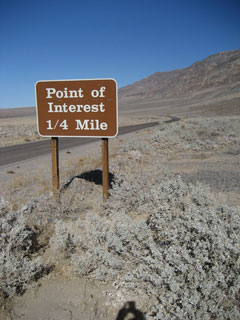|
|
 |
 |
 |
 |
Thoughts on self-defining Points Of Interest
Article by: Mike Barrett
Date: 19 Aug 2010
 This week I was thinking about self-defining POIs. What do I mean by that? Well we all know that a POI is a Point Of Interest, by self-defining I mean that the POI actually reports it's own position and other data back to a central server. This week I was thinking about self-defining POIs. What do I mean by that? Well we all know that a POI is a Point Of Interest, by self-defining I mean that the POI actually reports it's own position and other data back to a central server.
So what use could these self-defining POIs be in the real world? Depending on your viewpoint most of us have the technology capable of performing the task right now in the form of our mobile phones. All you need is an application that updates a server on a regular basis and, hey presto, you have a mobile self defining POI. This feedback loop is great in two ways. It is the enabler for us to get localised information about what is around us, and it also lets servers know where we are. It has been used in a number of ways to introduce Geo-Social Networking. But that is not what I am thinking of.
My thoughts on self-defining POIs were along the lines of everyday hardware that a company uses to run its business, like computers and tills. Pretty much every company in the country uses some kind of technology that is linked into the corporate servers somewhere along the line. The cost of GPS chipsets has tumbled over the last few years so with the addition of just a few dollars of hardware and some nifty software a company could generate some really useful information with just a small amount of effort when new equipment is installed.
Once the hardware is in place then the data collection and aggregation can start. A POI is often thought of as a coordinate and a title, but it can be so much more… opening times, offers, prices etc. The data would be stored on a server, possibly even the corporate web site. Data aggregators can poll the servers to request new data and then reformat it to present on their own data feeds.
This has all come about from talking to the guys from Cambridge Silicon Radio (the chipset manufacturer who merged with SiRF) who are starting to produce smaller and cheaper combination chipsets. These combinations include GPS, Wireless, Bluetooth and WiFi. This technology is getting cheaper and more ubiquitous as time goes by. Indeed economies of scale may see the inclusion of a full combi chipset with only say BT and GPS being implemented, but still being cheaper than having a dedicated chip.
I was also talking with the folks at Navteq in an effort to persuade them to define a dynamic infrastructure based on a data standard to allow real time delivery of content to connected devices from a centrally located data aggregator. I think I was probably a couple of years too far ahead with these discussions, and a year or so down the line we are starting to see some form of content delivery, but not something that we will see in everyday devices any time soon. I also think that one of the navigation companies is probably not the correct choice for a project like this. The application of the self-defining POI data is ubiquitous across SatNav, Mobile, SmartPhones, and Internet etc.
One big problem with this will be standards, but with XML being a universally accepted data definition mechanism it is reasonably simple to just plug in a new decoder for a new data source. The next problem will be the applications that can use the new self-defining POIs. A classic chicken and egg scenario. But this was where PocketGPSWorld started back in 2002 with the Speed Camera Database. We collected the data and soon enough manufacturers were providing speed camera functionality.
So what are the 'Real World' applications for self-defining POIs? Well how about mobile libraries? When the library is parked in place the computers are switched on and the POI will become active. The same could apply to any business. The POI would show as active when the business was open, excellent for chemists. How about fuel stations? The computers can identify when they are open, and also publish fuel prices, no more messing around with petrol prices weeks out of date. Maybe burger-bars at events, the list is endless.
Will this happen soon? I doubt it, as it requires co-operation and co-ordination from a number of unconnected, and possibly uninterested parties. It is only likely to succeed if the corporations involved can see the benefit of free advertising that this would generate.
| Comments
|
| Be the first to comment. Click on Post Reply below. |
|
|
 |
|
|
 |
 |
 |
 |
|
|